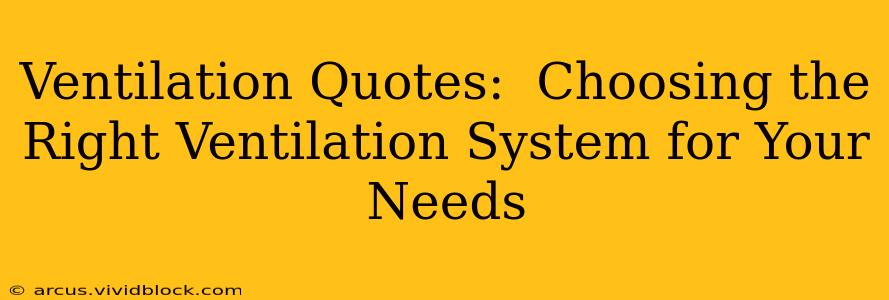Choosing the right ventilation system is crucial for maintaining a healthy and comfortable indoor environment. Poor ventilation can lead to a buildup of pollutants, moisture, and allergens, negatively impacting air quality and potentially causing health problems. This guide will help you navigate the world of ventilation systems, explore various options, and ultimately choose the best fit for your specific needs. We'll even delve into some common questions homeowners often have regarding ventilation quotes and installation.
Understanding Ventilation Systems: A Quick Overview
Before we dive into specific systems and ventilation quotes, let's understand the basics. Ventilation systems are broadly categorized into two types:
-
Natural Ventilation: This relies on natural forces like wind and temperature differences to move air. Examples include opening windows, using vents, and employing strategically placed doors. While cost-effective, natural ventilation's effectiveness is dependent on external weather conditions and may not be sufficient for all climates or building types.
-
Mechanical Ventilation: This utilizes fans and other mechanical devices to control airflow. These systems offer greater control and efficiency, especially in climates with less favorable weather patterns. Mechanical systems can be further divided into several subtypes, which we'll explore below.
Types of Mechanical Ventilation Systems
Several types of mechanical ventilation systems exist, each with its strengths and weaknesses. Understanding these differences is vital when comparing ventilation quotes.
-
Exhaust Ventilation: This system removes stale air from specific areas, such as bathrooms and kitchens. It's effective at removing moisture and odors but may not adequately replace the removed air.
-
Supply Ventilation: This system introduces fresh air into the building, often filtered for improved air quality. However, without an exhaust system, it may not effectively remove pollutants already present.
-
Balanced Ventilation: This system combines supply and exhaust ventilation, ensuring both the removal of stale air and the introduction of fresh air. This is generally considered the most effective method for maintaining good indoor air quality. Balanced systems can further be categorized into heat recovery ventilation (HRV) and energy recovery ventilation (ERV) systems, which recover heat or both heat and moisture from the exhaust air to pre-heat or pre-cool the incoming fresh air, respectively. This significantly improves energy efficiency.
What are the different types of ventilation systems available?
This question covers the ground already addressed above. The main types are natural, exhaust, supply, and balanced ventilation, with balanced ventilation further broken down into HRV and ERV systems. The choice depends on factors like budget, climate, building size, and desired level of air quality control.
How much does a ventilation system cost?
The cost of a ventilation system varies dramatically depending on several factors:
- Type of system: Simple exhaust fans are significantly cheaper than complex HRV or ERV systems.
- Size of the building: Larger buildings naturally require larger and more complex systems, increasing costs.
- Complexity of installation: Existing ductwork may simplify the installation, while new ductwork installation can significantly increase expenses.
- Location: Labor costs vary geographically, affecting the overall installation price.
Therefore, obtaining multiple ventilation quotes from different contractors is essential to compare pricing accurately. Remember that the cheapest option isn't always the best; consider the long-term benefits and energy savings of a higher-efficiency system.
What factors should I consider when choosing a ventilation system?
Several critical factors influence the selection of a ventilation system:
- Climate: Areas with high humidity benefit from systems with effective moisture removal. Cold climates benefit from HRV or ERV systems for energy efficiency.
- Building size and layout: Larger buildings often require more powerful systems, while the building's layout affects ductwork design and installation complexity.
- Budget: Set a realistic budget before comparing ventilation quotes to avoid unexpected costs.
- Air quality needs: Individuals with allergies or respiratory issues may require systems with superior filtration capabilities.
- Energy efficiency: Consider the energy consumption of different systems and their potential long-term cost savings.
How long does it take to install a ventilation system?
Installation time varies greatly depending on the system's complexity, the building's size, and the contractor's workload. Simple exhaust fan installations can be completed in a few hours, while more complex HRV or ERV installations might take several days or even weeks.
Getting Ventilation Quotes: Tips for Choosing a Contractor
Obtaining several ventilation quotes is crucial to ensure you get the best price and service. When comparing quotes, consider the following:
- Experience and qualifications: Choose a contractor with proven experience and appropriate certifications.
- Warranty and guarantees: Inquire about warranties on equipment and workmanship.
- Customer reviews and testimonials: Check online reviews to gauge the contractor's reputation.
- Detailed quote breakdown: Ensure the quote includes all costs, including materials, labor, and permits.
- Payment terms: Understand the payment schedule and any potential penalties for late payments.
By carefully considering your needs, researching your options, and comparing ventilation quotes, you can make an informed decision and create a healthier, more comfortable indoor environment. Remember that investing in a high-quality ventilation system is an investment in your health and well-being.

